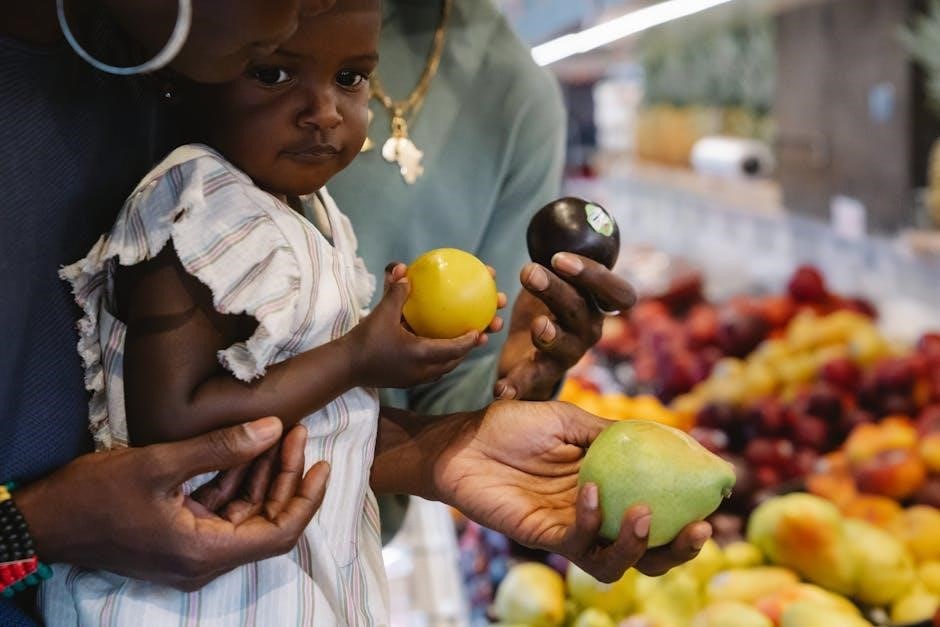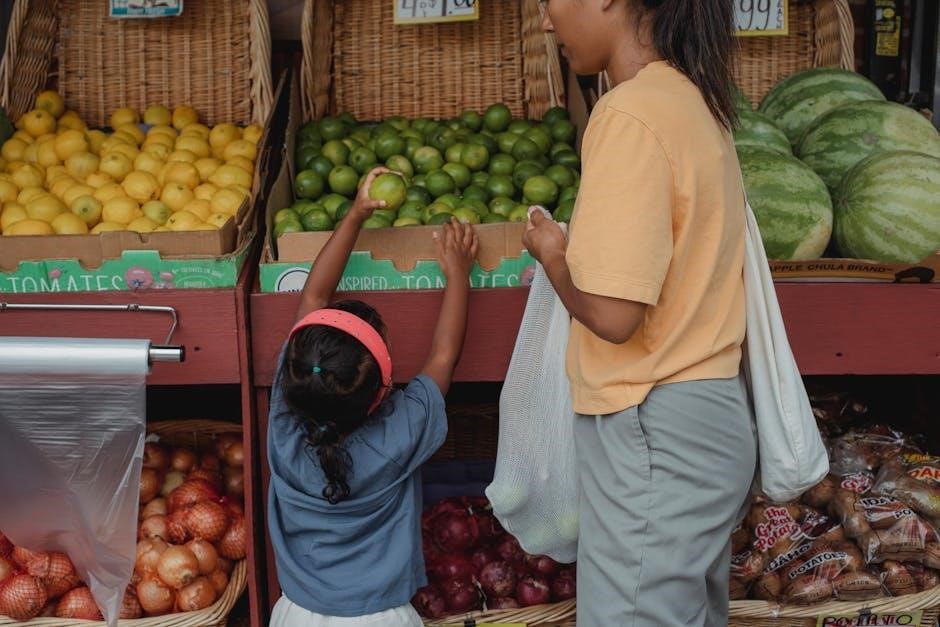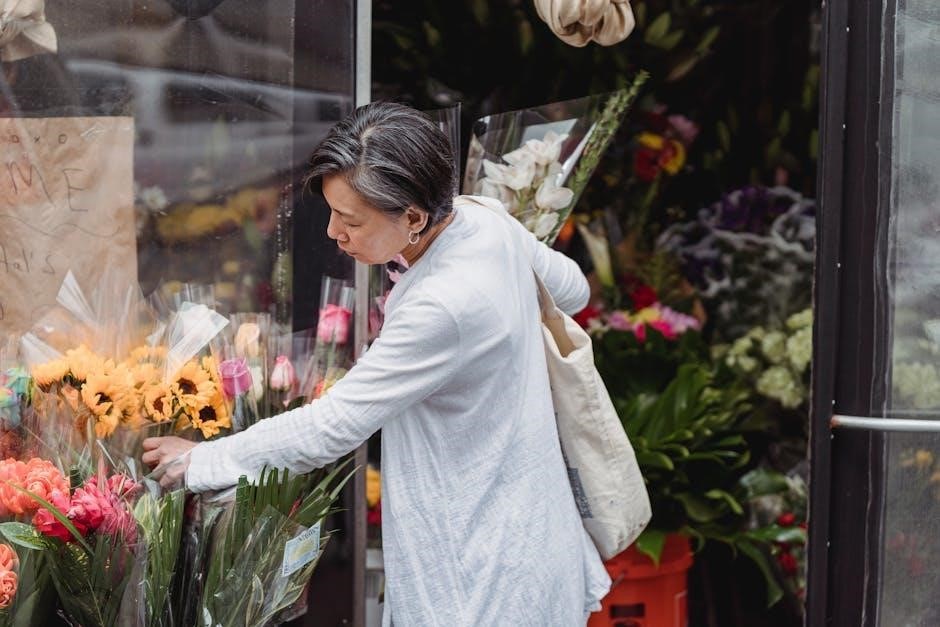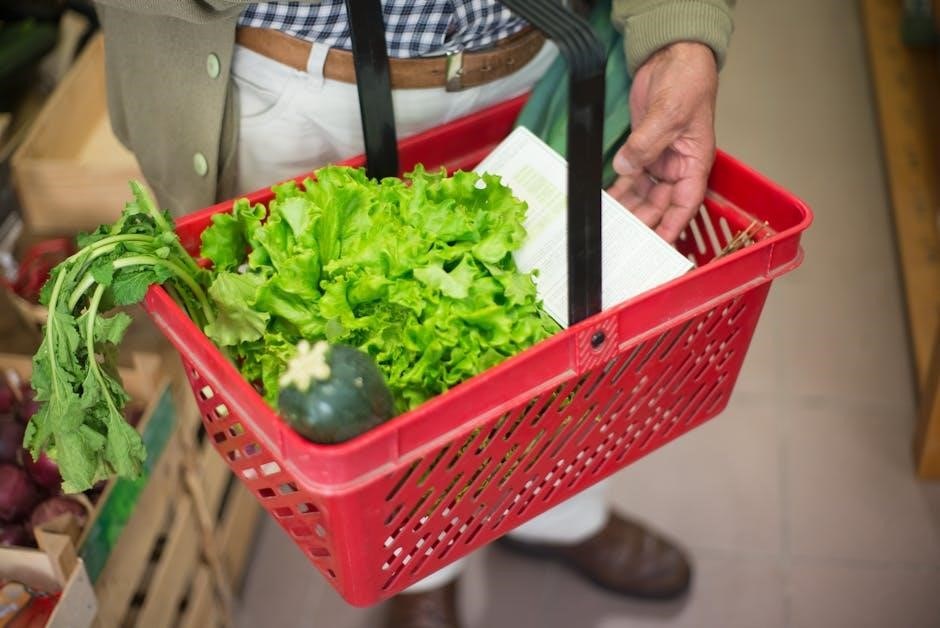James McBride’s The Heaven and Earth Grocery Store is a captivating novel set in a small Pennsylvania town, exploring themes of community, justice, and racial dynamics through interconnected lives and secrets.
The Significance of the Grocery Store in the Novel
The Heaven and Earth Grocery Store serves as the heart of the community, symbolizing unity and resilience. Owned by Chona and her husband, it provides more than essentials, offering kindness and indefinite credit to diverse neighbors. This humble shop becomes a sanctuary, reflecting the novel’s themes of justice, racial dynamics, and the power of human connection in a fragmented world.
The PDF Version and Its Accessibility
The PDF version of The Heaven and Earth Grocery Store offers readers convenient access to James McBride’s novel. Available online, it allows for easy downloading and reading on various devices. This format is particularly useful for students and book clubs, enabling annotations and quick searches. Its accessibility ensures the story reaches a broader audience, making it ideal for educational purposes and personalized reading experiences. The PDF is widely available through platforms like Litres and Bookshop.

Author Background and Style
James McBride, a celebrated author, brings masterful storytelling to The Heaven and Earth Grocery Store. His compassionate narratives reflect deep faith in humanity, blending historical context with emotional depth.
James McBride’s Literary Contributions
James McBride, renowned for works like The Color of Water and The Good Lord Bird, continues his impactful storytelling in The Heaven and Earth Grocery Store. His vivid narratives often delve into race, culture, and social justice, resonating deeply with readers. McBride’s ability to weave historical context with emotional depth has solidified his place as a significant voice in contemporary literature, earning him numerous accolades and a loyal readership.
The Unique Narrative Approach in the Novel
James McBride employs a masterful narrative approach in The Heaven and Earth Grocery Store, weaving together interconnected lives and secrets in a small Pennsylvania town. The story unfolds through vivid descriptions and emotional depth, blending historical context with fictional elements. McBride’s use of multiple perspectives and non-linear storytelling creates a rich tapestry, drawing readers into the cultural and racial dynamics of the community. His unique voice brings authenticity to the narrative, capturing the essence of human resilience and hope.

Setting and Historical Context
The novel is set in a small Pennsylvania town during the mid-20th century, focusing on Chicken Hill, a culturally diverse neighborhood with racial and social tensions.
The Small Pennsylvania Town and Its Cultural Dynamics
The story unfolds in Pottstown, Pennsylvania, where the neighborhood of Chicken Hill serves as a melting pot of cultures. Home to African Americans, Jews, and immigrant whites, the town’s diverse population creates a complex social fabric. The Heaven and Earth Grocery Store, owned by Moshe and Chona Ludlow, becomes a central hub where these groups intersect, fostering both unity and tension. This setting highlights McBride’s exploration of race, identity, and community in mid-20th-century America.
The Historical Era and Its Impact on the Story
Set in mid-20th-century Pennsylvania, the novel reflects the tumultuous era of racial tension and cultural shifts. The discovery of a skeleton and mezuzah in a well exposes the town’s buried past, revealing injustices perpetuated by the white establishment. This historical backdrop shapes the characters’ struggles and resilience, as McBride weaves a narrative that highlights both the divisions and the unifying power of community during a time of profound social change.

Key Characters and Relationships
Chona, the compassionate owner of the grocery store, extends kindness to all, while Nate and Addie Tamblin’s actions deeply influence the plot, revealing complex human bonds.
Chona and the Role of the Grocery Store
Chona, the proprietor of the Heaven and Earth Grocery Store, embodies the heart of the community. Her store serves as a sanctuary, offering more than just provisions—it provides emotional support and fosters unity among the diverse residents of Chicken Hill. By extending indefinite credit to her Jewish and Black customers, Chona exemplifies unconditional kindness, making the grocery store a symbol of hope and resilience in a fractured world.
Nate and Addie Tamblin’s Influence on the Plot
Nate and Addie Tamblin, friends and employees of Chona, play pivotal roles in uncovering the truth behind the skeleton and mezuzah discovered in the well. Their actions unravel the town’s hidden past, exposing the white establishment’s complicity in historical injustices. Through their involvement, McBride highlights the power of friendship and integrity in confronting dark secrets, ultimately contributing to the novel’s themes of justice and redemption.

Themes and Symbolism
The novel explores themes of community, justice, and racial dynamics, with the grocery store symbolizing unity and resilience, reflecting the town’s interconnected lives and cultural divides.
Community, Justice, and Racial Dynamics
In The Heaven and Earth Grocery Store, McBride masterfully explores the intertwined lives of a small Pennsylvania town’s diverse population, highlighting the struggles and resilience of its Black, Jewish, and immigrant communities. The novel delves into racial tensions, economic disparities, and the pursuit of justice, with the grocery store serving as a symbol of unity and hope. Through its characters, the story reveals how love and solidarity can transcend systemic injustices, offering a powerful commentary on human connection and societal divides.
The Symbolism of the Grocery Store
The Heaven and Earth Grocery Store symbolizes a space of unity and resilience, bridging racial and cultural gaps in a divided town. Owned by Moshe and Chona, it serves as a refuge, offering credit and kindness to those in need. The store represents the heart of the community, embodying hope and solidarity amidst conflict, and its significance extends beyond commerce, reflecting the enduring power of human connection and mutual support during challenging times.

Plot Summary and Critical Analysis
The novel unfolds around the discovery of a skeleton and mezuzah in a well, revealing a murder that unites the town’s fractured community. McBride masterfully interweaves justice, love, and history, creating a poignant exploration of human resilience.
The Discovery of the Skeleton and Mezuzah
The novel begins with the unearthing of a skeleton and a mezuzah in a well in Pottstown, Pennsylvania, unraveling a decades-old murder mystery. This discovery ties together the town’s history and its residents’ hidden pasts, exposing racial tensions and secrets. McBride skillfully weaves this event into the narrative, using it as a catalyst to explore themes of justice, community, and redemption. The mezuzah, a Jewish symbol, adds cultural depth, linking the town’s diverse populations and their intertwined fates.
The Resolution and Message of the Novel
The novel resolves with the truth about the skeleton and mezuzah revealed, exposing the town’s dark past and the role of its white establishment. McBride emphasizes that even in darkness, love and community prevail. The grocery store becomes a symbol of unity, highlighting the resilience of diverse cultures. The message underscores the power of human connection and justice, leaving readers with a hopeful vision of healing and collective strength in the face of adversity.

Reception and Reviews
The Heaven and Earth Grocery Store received widespread critical acclaim, earning a spot on Barack Obama’s 2023 favorite books list and praised by The New York Times, NPR, and Time Magazine as a bestseller.
Critical Acclaim and Reader Responses
James McBride’s The Heaven and Earth Grocery Store garnered widespread critical acclaim, praised for its emotional depth and intricate storytelling. Readers and critics alike celebrated its exploration of racial dynamics and community, with many highlighting its ability to blend historical context with universal themes. The novel was named a best book of the year by multiple outlets, including The New York Times, NPR, and Time Magazine, solidifying its place as a modern literary triumph.
Awards and Recognition
The Heaven and Earth Grocery Store has earned numerous accolades, including being named a New York Times bestseller and a Notable Book of the Year. It was also recognized as one of the best books of 2023 by NPR, The Washington Post, The New Yorker, and Time Magazine. The novel further received praise as one of Barack Obama’s favorite books of 2023, showcasing its impactful storytelling and resonance with readers.

Discussion Questions and Reflection
The novel offers reflection prompts, guiding readers to explore themes, characters, and moral dilemmas, fostering deeper analysis and personal connection to the story’s universal messages.
Guiding Questions for Book Clubs
How does the grocery store symbolize community and resilience? What role do historical events play in shaping the characters’ lives? How does McBride address racial dynamics and justice? What significance does the discovery of the skeleton and mezuzah hold? How do Chona, Nate, and Addie influence the plot? What message does the novel convey about love and unity? How does the setting of a small Pennsylvania town enhance the story? What universal themes resonate most with you?
Exploring the Novel’s Universal Themes
The novel delves into universal themes of community, justice, and racial dynamics, offering a poignant reflection on human resilience. The grocery store serves as a symbol of unity, bridging cultural divides. McBride’s portrayal of interconnected lives highlights the power of love and solidarity in overcoming adversity. The discovery of the skeleton and mezuzah underscores the lasting impact of historical injustices. Through its vivid storytelling, the book invites readers to reflect on the enduring strength of human connections and the quest for justice in a flawed world.
